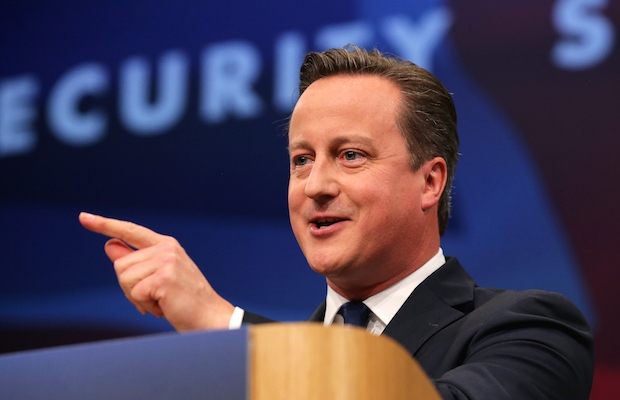Clearly, the best thing a Prime Minister can do is announce that he doesn’t want to be Prime Minister for much longer. David Cameron has just delivered the clearest, most passionate and most authentic speech of his premiership to the Tory party conference, and all of it was founded on him not standing again as party leader in 2020. Early on, he said:
‘We’re only halfway through. For me, that has a very literal meaning. I can say something today that perhaps no Prime Minister has ever really been able to say before. I’m starting the second half of my time in this job. As you know, I am not going to fight another election as your leader. So I don’t have the luxury of unlimited time. Let me tell you: I am in just as much of a hurry as five years ago.’
He may have accidentally told James Landale that he wouldn’t contest another election when he was chopping vegetables during the 2015 campaign, but setting a deadline for his premiership and his near-death experience in May’s election has focused Cameron’s mind so that he has finally set out what he stands for, what he thinks is important, and what he wants to leave office having achieved. He is normally mocked as the ‘essay crisis’ Prime Minister who gets everything done at the last minute and does it annoyingly well, too. But today he appeared more like the final-year student who has grown up enough to plan, research and prepare their truly excellent dissertation ahead of time.
Not all of this was typical Tory catnip. Cameron returned to equality for gay people a number of times in his speech, for instance, mentioning his introduction of equal marriage and putting Gay Pride parades alongside the suffragettes. He extolled the importance of the commitment to spending 0.7 per cent of gross national income on international development each year, and paused expectantly for applause when he did. And the applause came. The Tory leader has given his party official permission to obsess about the leadership contest, and in return it has to put up with him being more centrist and more proud of achievements such as aid spending and gay marriage than many would like.
He made social reform the key theme of his speech, saying that ‘to make Britain greater, we need to tackle some deep social problems’. He ran through housing, poverty, education, prison reform, social mobility, discrimination, and extremism.
Cameron has had a good conference: the contrast between Labour’s nervy meeting last week and this annoyingly stage-managed week in Manchester couldn’t have been bigger. He did attack Jeremy Corbyn as possessing a ‘security-threatening, terrorist-sympathising, Britain-hating ideology’, and mocked Labour’s economic policy (he told the audience that he had read Richard Murphy’s The Joy of Tax: ‘I took it home to show Samantha. It’s got 64 positions and none of them work’.). But his speech was about what the Tories were going to do while Labour occasionally intruded on them in a comic fashion.
His conclusion had the weak Bonnie Tyler-esque phrase of the ‘turnaround decade’ and the truly awful phrase the ‘great British take-off’, but it did contain a vision of the centrist compassionate Conservatism that Cameron wants to characterise the rest of his time in office.

Picture: Carla Millar
But now he must leave the conference and prepare for an autumn and winter that those who are thinking ahead believe will be ‘brutal’ for the Tories, as they announce big cuts to public spending and try to defuse a growing row on tax credits. Cameron did include a brief passage on the deficit and the need for a surplus in his speech, but he didn’t mention tax credits at all. He was audaciously vague on Europe. He said little on Syria. And those matters will take up much more of his time and energy in the coming months than anything he expounded on today.







Comments